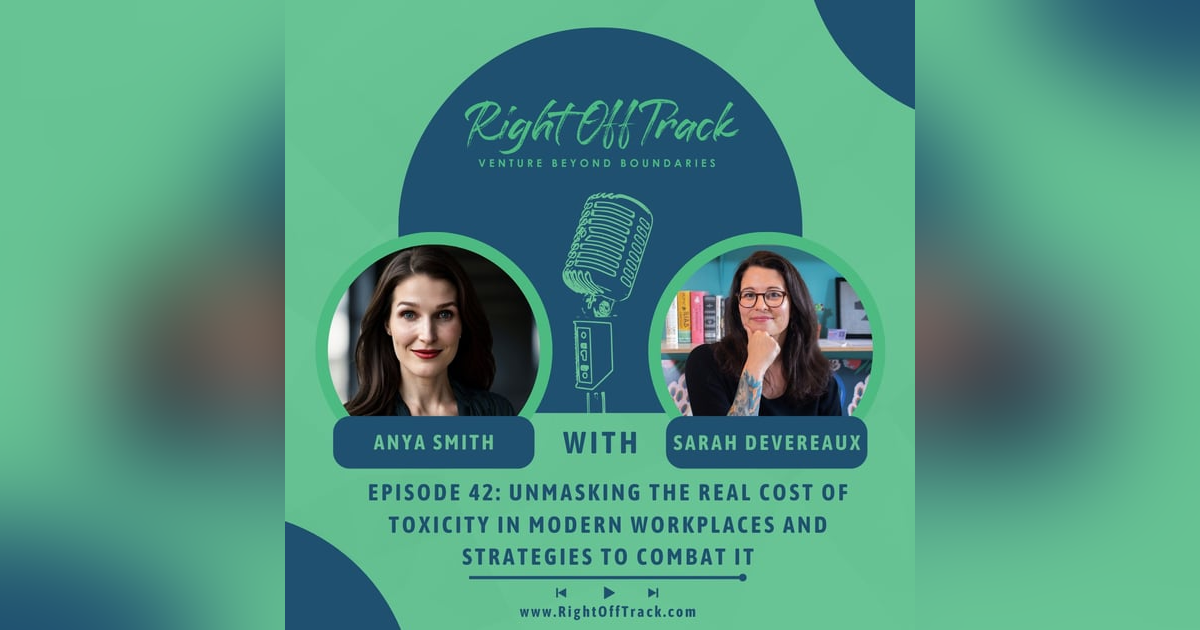Unmasking the Real Cost of Toxicity in Modern Workplaces and Strategies to Combat It - Sarah Devereaux is RightOffTrack | Anya Smith


Ever wondered how to navigate challenging workplace dynamics and evolve with optimism and resilience?
Dive deep with Sarah Devereaux, who navigated the thrilling corridors of Google, only to gradually fall out of love with the tech giant. Embarking o...
Ever wondered how to navigate challenging workplace dynamics and evolve with optimism and resilience?
Dive deep with Sarah Devereaux, who navigated the thrilling corridors of Google, only to gradually fall out of love with the tech giant. Embarking on an entrepreneurial adventure, she became a vibrant Leadership Coach, merging her tech insights with holistic human connections.
As Sarah branched out, building a notable social presence, she also embraced new passions like sustainable farming. These fresh endeavors aren't just hobbies; they're reservoirs of wisdom she applies in business, teaching us the symbiotic relationship between nature and workplace harmony.
Don't miss out on:
- 🎧 Sarah's eye-opening reasons behind her departure from the tech giant and how it shaped her current ethos.
- 🤔 How can leaders navigate work through insecurity and lack of authenticity
- 🚀 Proven strategies to handle workplace challenges while preserving your mental and emotional well-being.
- 🧭 Her unique approaches to fostering authentic leadership and promoting meaningful workplace cultures.
- 🔥 Sarah's take on redefining success, shifting from corporate accolades to intrinsic values and genuine impact.
- 🌱 The unexpected parallels between sustainable farming practices and contemporary business leadership.
Key Insights Include:
- The power of resilience: How facing down workplace adversity can pave the path to personal growth.
- The intertwining journey of personal rediscovery and professional evolution.
- Strategies for aspiring leaders to build a human-centric leadership approach in today's cutthroat corporate world.
Perfect for:
- 💼 Professionals at crossroads, contemplating a pivot from traditional roles to something more meaningful.
- 🌿 Those intrigued by how diverse passions can weave into powerful business narratives.
- 🌟 Anyone seeking fresh, genuine, and actionable insights on modern leadership and personal growth.
🌟 Our Mission at RightOffTrack:
At RightOffTrack, we believe everyone's journey is unique. We're here to ignite the passion within, showcasing stories of individuals who've dared to diverge from the conventional. By sharing these narratives, our goal is to inspire you to pursue your distinctive path, embrace your purpose, and truly make a mark.
🚀 Join us in empowering this mission. If this episode resonates, please 📢 share it with a friend or colleague.
Our Podcast With Purpose:
- RightOffTrack is a podcast with a purpose and I am supporting an amazing non-profit Ready To Empower (which empower woman world wide).
- RTE is celebrating it's 10th anniversary this year and has an awesome goal of raising $50,000 by Dec 8th, 2023 (with all proceeds going to the program operation and supporting the women).
- Welcome your empowering donation (of any size) here: https://www.flipcause.com/secure/cause_pdetails/MTg1MzUy
- Ps. RTE podcast Episode: https://podcast.rightofftrack.com/s1e1
Connect with the Guest:
- Sarah's LinkedIn: https://www.linkedin.com/in/sarah-devereaux-b55706a0/
- Sarah's Coaching Website: http://www.whitepineleadership.com
Kudos to My Design & Editing Team:
- Design Magic - Ubaid Ur Rehman (LinkedIn) , @ubaid.designs (Instagram)
- Editing Magic - Abdullah (MAC) Chughtai (LinkedIn) , @illusionist_hu (Instagram)







